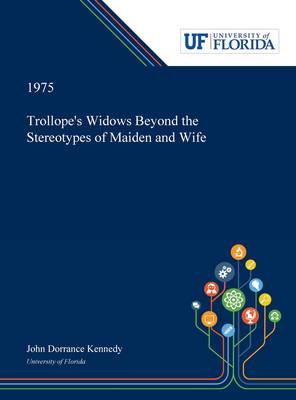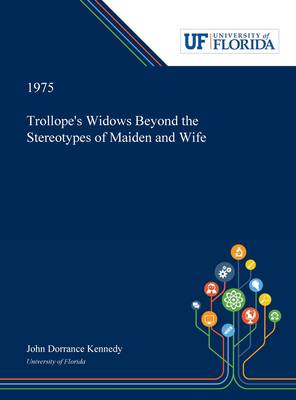
- Retrait gratuit dans votre magasin Club
- 7.000.000 titres dans notre catalogue
- Payer en toute sécurité
- Toujours un magasin près de chez vous
- Retrait gratuit dans votre magasin Club
- 7.000.000 titres dans notre catalogue
- Payer en toute sécurité
- Toujours un magasin près de chez vous
126,45 €
+ 252 points
Format
Description
Abstract: The widow is a recurrent character type in the novels of Anthony Trollope. Widows are major characters in many of the forty-seven novels. Ordinarily Trollope tends to repeat and to endorse the conventionally-approved patterns of behavior that governed the values of women who expected to marry or who were already married. He approves or disapproves of maidens and wives in his fiction according to their belief in or adherence to the standard female role of wife. However, widows stand outside the nineteenth-century social code that glorified marriage and advocated female submission to the husband. In dealing with widows and widowhood, Trollope is able to examine honestly and thoroughly the social and emotional problems of a mature woman living outside male control, without disturbing his own or his readers' sense of the proprieties. Trollope 's awareness of widows is singular among major nineteenth century novelists and leads him to conclude that the widows' apparent freedom is an illusion. Virtually all of his widows are defeated socially and emotionally by their widowhood and by their sex. This dissertation studies every major widow in the novels, together with others more minor; these widows demonstrate the evolution of Trollope's perception and artistry. His awareness of widows developed chronologically. The earliest widows (1847-58) are little more than background characters; their successors (1859-61) are prominently displayed but incompletely explored. With the next group of widows (1862-64) Trollope begins to show closelyexamined widows in ordinary life. His most sophisticated widows (1864-71) possess money and/or strong obsessions. Trollope's last widows (1873-82) do not develop beyond his earlier revelations. The dissertation is organized chronologically. The Introduction provides a synopsis of existing Trollope criticism. Chapter I surveys the status of middle-class English women in the nineteenth century. Chapter II covers the widows of 1847-58; Chapter III explores those of 1859- 61. The widows of 1862-64 are examined in Chapter IV and the widows of 1864-71 are seen in Chapter V. Chapter VI is concerned with the widows of 1873-82. The Conclusion contains the findings of this study. Dissertation Discovery Company and the University of Florida are dedicated to making scholarly works more discoverable and accessible throughout the world. This dissertation, "Trollope's Widows Beyond the Stereotypes of Maiden and Wife" by John Dorrance Kennedy, was obtained from the University of Florida and is being sold with permission from the author. A free digital copy of this work may also be found in the university's institutional repository, the IR@UF. The content of this dissertation has not been altered in any way. We have altered the formatting in order to facilitate the ease of printing and reading of the dissertation.
Spécifications
Parties prenantes
- Auteur(s) :
- Editeur:
Contenu
- Nombre de pages :
- 254
- Langue:
- Anglais
Caractéristiques
- EAN:
- 9780530019635
- Date de parution :
- 08-12-19
- Format:
- Livre relié
- Format numérique:
- Genaaid
- Dimensions :
- 216 mm x 279 mm
- Poids :
- 879 g







